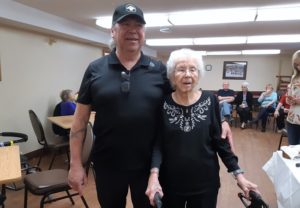After 100 years, Ruby still remembers the important things

By Maurice Switzer
PETERBOROUGH— When you have lived for 100 years, you can be excused for forgetting a few minor daily details.
Ruby Marsden Hicks, who reached that milestone on May 20, may at times forget whether nurses administered her 10 a.m. asthma puffer dose, or what the menu choices are for lunch in the Peterborough Retirement Residence dining room, or even today’s date.
But some 36,000 days after being the only one of 13 children raised by Moses and Nellie Marsden of Alderville First Nation to be born in a hospital – in Cobourg – she still remembers the really important things in life.
“My mother was a beautiful woman – she had such shiny black hair,” she recalls of Nellie Orma Franklin. “There was a flu epidemic when Ma first had children and a couple of babies died.”
Her mother was 43 when Ruby was born, and she credits Nellie’s loving persistence for nursing her through a bout of diphtheria that threatened her survival.
She says father Moses Marsden, who served as Alderville Chief from 1905-1909, was “a kind man”, born Moses Muskrat and adopted into the Marsden family after being orphaned as a young child. She still speaks with pride about his accomplishments as a master log cabin builder who had to teach himself how to read and write after running away at the age of eight from Alnwick Manual Labour School, part of Canada’s network of Indian Residential Schools.
Despite always providing a caring nest in which to raise only child Maurice, Ruby still remembers the guilt she sometimes felt for being a single working mom, not common in the 1950s. She recalls giving her parents $5 of her $12 weekly pay cheque – it cost another $3 for bus fare to her factory job in Peterborough – for room and board for her and her son.
She had brought Maurice back from Toronto to Lakefield to live with Moses and Nellie in their modest little fieldstone and mortar house that did not have running water, central heating, or indoor plumbing, after realizing that a marriage with Harold Switzer was not going to be successful.
“He was a good man, and he loved us,” Ruby stresses, but the Toronto taxi driver had a weakness for placing too many wagers at Woodbine Race Track.
She would enjoy a happy second partnership for almost 40 years with Arthur Hicks, that lasted until he had a heart attack in the kitchen of the little two-storey house they had bought and remodelled on Fitzgerald St. in Lakefield. That home had been the scene of many happy gatherings of family and friends, but Ruby eventually decided that she no longer wanted to worry about replacing shingles or repairing doors.
She moved to a seniors’ apartment on the other side of the village, located on the grounds that had previously been occupied by the village elementary school where she and, later, son Maurice, would both be taught by the same Grade One teacher, the kindly Miss Elsie Kidd, who spent 51 years in the classroom.
These days, when she isn’t doing crossword puzzles, or trying to win quarters at retirement residence Bingo games, Ruby might be reading her daily copy of the Peterborough Examiner, the newspaper to which her father Moses regularly submitted letters to the editor about the injustice of Canada’s dealings with First Nations.
Ruby’s archive of family photos and papers includes a 1983 recollection by her father of the origins of the 1923 Williams Treaty. Moses recalls his fruitless efforts as councillor and chief to get provincial and federal governments to agree on paying for Alderville lands that had been taken up by settlers, as well as the treaty commissioners’ pledge that the Indians would retain hunting, fishing, and trapping rights if they agreed to the treaty terms. They lied.
On Nov. 17, 2018 – the same day on which Ruby travelled to Alderville to accept a cheque that will cover this year’s rent at Peterborough Retirement Residence – a federal official announced the formal resolution of the Williams Treaty claim.
“We are sorry,” Carolyn Bennett, federal Minister of Crown/Indigenous Relations, told chiefs from the seven Williams Treaty First Nations, noting that what academics have termed the worst treaty in Canadian history “provided insufficient compensation and inadequate reserve lands …. and failed to recognize and protect your treaty rights.”
Among the group who gathered to sing Happy Birthday on Ruby’s 100th birthday on May 20, 2019, was J.R. Marsden, a cousin, much of whose 16-year-term as Alderville Chief was dedicated to achieving a settlement to the 95-year-old Williams Treaty.
The oldest Alderville citizen, Ruby Marsden Hicks, is the only current band member who was alive when the treaty came into effect in 1923.
When a journalist attending her birthday party asked her what lessons she learned from her parents, she didn’t hesitate.
“To not give up…not start something and quit.”
****
Maurice Switzer is Ruby’s only child. He lives in North Bay where he is the principal of Nimkii Communications, a public education practice with a focus on the treaty relationship.


